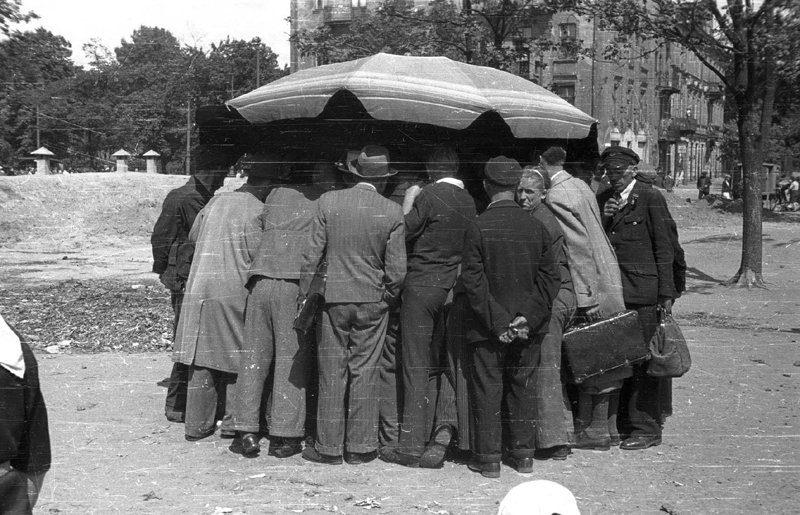Once, long ago, when my brother met me at
an airport to give me a lift to the family apartment, he said with a canny
look, “Let me tell you about my new scam.”
His “scam” was simply a plan to redeem hundreds of coupons in
newspapers, so as to acquire a lifetime supply of whatever at a reduced
price. Being in the newspaper
distribution business, he had access to reams of unsold papers and so had a
free hand in clipping reams of coupons.
There was nothing illegal about this; he was simply taking advantage of
his position to buy things cheap. Years
later, when I came back to bury him, I found the apartment crammed with his
spoils: a lifetime supply of deodorants, ditto of detergent, car repair
equipment that only a grease monkey could appreciate, and I don’t recall what
else; it took me weeks to clear it all out.
But what I still remember most vividly, was that look on his face when
he announced his so-called scam: canny, shrewd, knowing, worthy of Wily Coyote,
the trickster of many Native American legends.
It was indeed the look of an operator about to put something over on
others – in other words, the look of a con man.
New York, like any big city, is a mecca
for con men, cheats, and thieves. An
African American cruising the streets in a fancy limousine stuffed with
clothing once asked with a winning smile if I’d like to buy some clothes; I
declined, convinced that they were stolen items. He was surely a thief or a fence.
 |
| The mug shot of Bernard Madoff, whose Ponzi scheme was the biggest fraud in U.S. history. |
On another occasion when I found myself at
night in midtown, I saw a man trying to sell some paper dolls to some
sailors. Aligned side by side, the dolls
were dancing on the sidewalk as if by magic.
It was an old trick still being played.
But the sailors weren’t fooled; they were looking for the hidden strings
that propelled the dolls. Seeing this,
another man standing nearby announced in a resonant voice, “It’s show time!” He repeated his warning a second time, and
the vendor of the dolls packed them up and moved on down the street. “I knew there was a hidden string,” said one
sailor, “and here it is.” Looking
closely, he had detected the almost invisible string.
Another scam that used to be practiced in
the city involved a man entering into conversation with a stranger outside a
bank and telling him that banks were frauds, they took your money but wouldn’t
give it back. He would repeat this
assertion so consistently, so smugly, that the other man would wax indignant
and tell him he was crazy. “Go ahead,
just try,” the first man would dare him, “try to withdraw a sizable sum, and
you’ll see that I am right.” So the dupe
would do just that, and it was just a matter of time before he and his money
were separated. How could anyone fall
for such an obvious scam, you and I and almost everyone would wonder, and the
victim, once disabused, would wonder the same.
But at the time, he fell for it hook, line, and sinker, and – to mix
metaphors – got royally fleeced.
Today the cheats take advantage of the
Internet to reach you in your home.
Once, out of nowhere, I got an e-mail:
“Aloha! I’d like to get to know
you. From your profile I think we have
lots in common.” The sender seemed to be
a pleasant young woman. Surprised and
charmed, I was tempted to respond, but some good spirit deep within me, some
demon of skepticism, held me back, and I quickly realized that this was
probably a scam, bait to entice you to interact and yield personal information
useful to the scammer. Like all such greetings since, I deleted it.
On another occasion I got an e-mail
purporting to be from my publisher, saying that on the spur of the moment he
had taken a trip abroad – I think he said to the Philippines – was in trouble
there and needed money; if I could send him several hundred, he’d repay me as
soon as he got back. This smelled fishy,
so I asked for more information. The
appeal was repeated urgently, but it seemed fishier than ever, so I asked how
he knew me, what was the connection? No
answer came. I then e-mailed the
publisher and got an immediate reply: an account of his had been hacked, and
this appeal was going out to many of his authors and acquaintances whose e-mail
addresses had been discovered; he was now closing the account and opening
another with a different password.
Beware of sudden e-mail appeals. With hindsight, I realize that I shouldn’t
even have answered the first appeal before contacting him for verification.
And of course we’re constantly assaulted
by ads that make glowing vague promises.
WOULD YOU
LIKE TO BE
A MILLIONAIRE? one asked. Amused, I answered by mail as instructed:
“Yes, please tell me how to become a millionaire!” The reply was simply a run-of-the-mill
invitation to invest in something or other, an offer so drab and uninspired
that it wasn’t worth messing with, even to chuckle or debunk it.
I’m not always so canny. Recently I got an envelope labeled Social Security & Medicare, personal
statement enclosed, and in bold red ink, EXPIRATION NOTICE. At the very thought of my Social Security
and Medicare expiring, I almost
panicked and hurriedly opened the envelope.
So what did I discover? It was an
appeal from the National Committee to Preserve Social Security & Medicare,
urging me to renew my membership – in other words, give them more money. Looking closely at the envelope, I now saw
that the words “National Committee to Preserve” were indeed there, but in small
print. They had tricked me into opening
the envelope. But this so annoyed me
that I vowed never to give them money again – not exactly the dénouement they
intended.
There are trivial tricks and scams, but
serious ones perpetrated by real artists of the trade abound. The current AARP Bulletin, distributed widely to golden oldies, has an article
entitled “Season’s Cheatings” that mentions several online scams practiced at
this time of year on the elderly. For
instance:
· Notifications by e-mail claiming that the U.S. Post
Office or some other entity has a delivery for you; click on the link and you
get malware.
· Rogue retailers offering bargain prices that you find
on social media or through search engine results; they want your credit card
number or will sell you inferior goods (or maybe nothing at all).
· Charity cons claiming to benefit police, firefighters,
veterans, sick or needy children, or victims of natural disasters; again, they
want your credit card number.
· Gotcha giveaways offering free merchandise or free
vacations, likewise hoping to get your credit card or other sensitive
information.
Not to mention scams that
relieve some oldsters of their life’s savings, or induce them to send money
abroad to rescue a grandchild who is reportedly in some kind of unforeseen
trouble.
Being a bit of a tightwad and suspicious
by nature, I’ve never fallen for any of these cons, but long ago a friend of
mine was outrageously conned by a master of the trade. (I’ve told this story before, but I’ll tell
it here again, since it exemplifies this post’s theme.) My friend Kevin, a natty, sophisticated New
Yorker, told me he had just met an interesting visitor from South America (I
forget which country) named Vergilio and was quite taken with him. The next thing I knew, Kevin had arranged
with a friend who was going away on vacation to let Vergilio move into her
place temporarily. Kevin’s praise of
Vergilio grew ever more intense, and finally I met this paragon when Kevin
invited me over for cocktails. Vergilio
was a good-looking young man of about thirty, no kid, well-groomed and
well-mannered, with a soft, pleasing voice and a gracious smile. Good enough, but everything about him, while
pleasing, seemed strangely vague. He was
right there in the present, but he seemed to have no past and no discoverable
future – a mysteriousness that made him that more interesting to Kevin.
“What is it about this guy that so gets to
you?” I asked Kevin later.
Kevin flashed a look of intensity. “I’ve never known anyone like him. He’s
fascinating. He has glamour!”
Glamour – a word I associate with Hollywood brouhaha –
was something I had never hankered for, but it was clear that it appealed to
some need deep in Kevin’s psyche. But I
was worried. For me, Vergilio, who had
appeared out of nowhere, was a smile over a cocktail glass, nothing more.
 |
In the weeks that followed, Kevin began evincing alarm:
Vergilio's health was not all it should be. Then he informed me that
Vergilio was going to consult a doctor on the doctor's yacht, which struck me
as an odd site for a consultation. Next I got a phone call from Kevin,
with anguish in his voice: "Vergilio is dying!" His friend had
informed him that he was suffering from a long-term fatal ailment, its exact
nature undisclosed, that required treatment in Europe; he would be leaving
soon. So Vergilio left; Kevin moped about, waited for news, worried.
Postcards came from Paris, Monte Carlo, Nice, with only the briefest
message and no news about his treatment.
Three weeks later he was back, well-groomed and urbane
as ever, the same soft voice, the same smile over a cocktail glass. He
showed Kevin and me a series of photographs from his trip, every one featuring
a smiling and handsome Vergilio in a well-appointed residence, his host
unidentified: photos of a narcissist. By now even Kevin sensed something
amiss, but his need of glamour locked him into the spell.
Vergilio now informed Kevin that he had to return to
Europe for an operation that might or might not save his life, probably not;
professing embarrassment, he confessed he needed money for the trip. Why
he had to turn to a new friend, and not to old friends and family, went
unexplained. Kevin at once gave forth of his own meager savings, then
phoned any number of friends, entreating them to loan him what they could. Some
did, some didn't. I myself, unable and unwilling to label Vergilio a liar
or a fraud without convincing evidence, promised five hundred dollars but then,
common sense prevailing, gently but firmly declined. "I don't
believe in it," I explained. Kevin’s response: "I feel like
I've been kicked in the teeth.”
Vergilio departed once again for Europe, and I heard no
more of him, for Kevin and I were now estranged. Finally I phoned a
mutual friend, asking how he was. "He's learning what he has to
learn," she said, but refrained from saying more. Months passed;
other matters claimed me, but I thought often of Kevin. Finally he phoned
and invited me over. He looked worn and wan, but got to it right away:
"If I ever see him again, I'll say to him, 'What? You're not
dead? But that's why I gave you all that money and sent you back to
Europe. Dead -- you should be dead!'"
A hard look came over him that I had never seen before.
To my knowledge, Vergilio never reappeared in New York;
if he did, it was at a far remove from Kevin. Kevin never mentioned his
name again. Since his finances were habitually precarious, I doubt if
he ever repaid any of his friends. But of one thing I am sure:
Vergilio was off somewhere, on this continent or another, smiling over a
cocktail glass and enlisting the sympathy and generosity of friends. New
friends; to the old ones he wouldn't dare show his face.
Vergilio was a classic example
of the con man, and Kevin a classic example of the dupe. (Note my insisting on “con man” and never
“con woman” or “con person”; it seems to be a males-only game.) An article by Maria Konnikova in the Sunday
Review section of the New York Times of
December 6 of this year argues that we humans are born to be conned, that the
true con artist makes us feel good about ourselves, makes us think he’s giving
us just what we deserve. The victim is
always swept up in a narrative that at the time seems absolutely
compelling.
So it was with Kevin. He had a deep need to experience glamour, and
Vergilio satisfied that need marvelously, to the point that Kevin ignored all
the danger signs: the vagueness of Vergilio’s ailment, and his obvious good
health; Vergilio’s inability to get help from old friends and family, so that
he instead relied on a newfound friend of meager means; Vergilio’s trip to
Europe supposedly to get medical aid, a trip memorialized in photos of Vergilio
in luxury settings that belied the very purpose of the trip. Kevin was no fool, but he fell for the con
that a shrewd operator offered him, and his awakening was harsh; the wound was
long in healing, if it ever did heal completely.
The Maria Konnikova article
cited above gives another example of a con.
On her first day in New York a college student named Robin Lloyd
encountered a loud-mouthed performer behind a cardboard box on Broadway who
invited the crowd to “follow the lady” as he switched three playing cards about
face down with lightning speed; if you bet you could guess correctly where the
“lady” – a queen – went, he would double your money. She was taken with the offer, excited, all
the more so when another bystander wagered and won. So even though she had only two $20 bills in
her pocket and no winter coat, she wagered all she had. The moment she did so, she regretted it, and
of course she lost. The game that duped
her is called three-card monte and is still played on the streets of New
York. The monte operator, a good judge
of character, had sensed her need and exploited it. And the bystander she saw win was of course a
plant, put there to lure victims in.
Another classic case of a con man in operation who must be deft with his
fingers and spiel. The game itself has
been played in many countries as far back as the fifteenth century, and is
still being played today.
 |
| ZioDave |
Robin Lloyd was tricked because
she needed money; my friend Kevin was tricked because he needed glamour;
always, the con man offers something we deeply desire. Which is why con men will always exist, and
someone will always be duped. What do you need? Be careful, there’s someone out there eager
to offer it to you; if you believe him, you’ll be had.
 |
| Three-card monte in Warsaw in 1944. Even in wartime, under German occupation and with the Red Army approaching, it flourished. |
 |
| In Mexico in 1828. An international con. |
A postscript on cemeteries: Having read last week's post on cemeteries, our friend Carol tells how, when her stepfather died, she and her mother toured a cemetery in New Jersey, looking for a plot. A blustery bleached blonde drove them around. She kept up a running conversation, assuring them, "The place is well kept up. You'll never find any empty plastic milk jugs lying around here." A great comfort to the bereaved family.
Freakish weather: Tuesday, December 22, the shortest day of the year, was also the darkest I have ever experienced in New York. A short day, overcast; we had lights on all day. And Thursday, December 24, was the mildest Christmas Eve I have ever known, with temperatures in the low 70s. Spring flowers have been reported; whatever their normal season, I see some white ones right next door.
Coming soon: Fear of Falling: my fears, and everyone’s. Then: A daring con man of our time, an alleged whiz kid of deceit.
© 2015
Clifford Browder

No comments:
Post a Comment